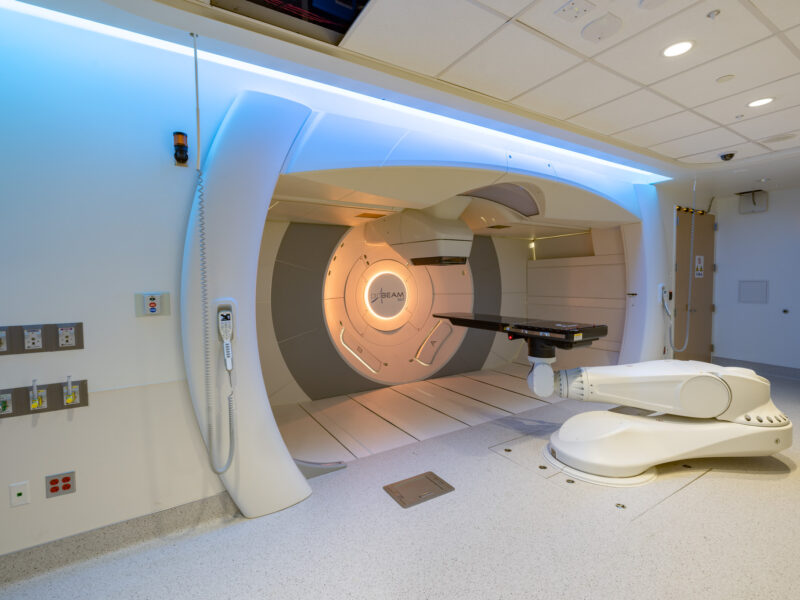Novel Genetic Variant Identified in CARMIL2 Deficiency
Novel Genetic Variant Identified in CARMIL2 Deficiency https://pediatricsnationwide.org/wp-content/uploads/2021/02/AdobeStock_134232290-DNA-header-1024x575.gif 1024 575 Lauren Dembeck Lauren Dembeck https://pediatricsnationwide.org/wp-content/uploads/2021/03/Dembeck_headshot.gif- August 19, 2020
- Lauren Dembeck

International program facilitates the diagnosis of a rare immunodeficiency in two children caused by a novel genetic variant.
A multidisciplinary team of physicians and scientists at Nationwide Children’s Hospital have identified a novel loss-of-function variant causing CARMIL2 deficiency, an inborn error of immunity, in two Saudi Arabian brothers born to consanguineous parents. The case was published in Frontiers in Immunology.
In September 2019, Timothy Cripe, MD, PhD, FAAP, chief of the Division of Hematology, Oncology and Blood and Marrow Transplant at Nationwide Children’s received a consult from a physician in Saudi Arabia through the hospital’s Global Patient Services (GPS) program, which supports the needs of patients and families arriving from international locations.
The patient, a 12-year-old male was critically ill with eczema, non-tubercular mycobacterial infection and severe inflammatory bowel disease. He was exceedingly undernourished with short stature and developmental delay. He also had numerous aggressive tumors throughout his body.
“The patient had an unusual constellation of symptoms, including several EBV-smooth muscle tumors, which put CARMIL2 deficiency high on the differential diagnosis,” says Roshini Abraham, PhD, D(ABMLI), FAAAAI, founding director of the Diagnostic Immunology Laboratory, director of the Jeffrey Modell Foundation Diagnostic and Research Center for Primary Immunodeficiencies (PID) at Nationwide Children’s and senior author of the study. “Dr. Cripe recognized there was likely an immunological component and connected with me through the Immunology Clinic.”
The Jeffery Modell Center, the Immunology Clinic, the Diagnostic Immunology Laboratory and the Primary Immunodeficiency Treatment Consortium (PIDTC) bring together a multidisciplinary team from numerous clinical and research disciplines.
After the patient arrived at Nationwide Children’s, extensive immunological and genetic testing revealed the patient indeed had CARMIL2 deficiency due to a novel homozygous pathogenic variant, which resulted in loss of CARMIL2 protein required for appropriate T cell activation and function.
“The only reasonable way to treat his CARMIL2 deficiency with the multitude of EBV-SMT was a hematopoietic cell transplant,” says Dr. Abraham. “It was a remarkable collaborative effort because this child had so many complications. There was no doubt that a transplant was risky, but at the same time, it was the only logical option.”
Under the leadership of Hemalatha Rangarajan, MD, a hematopoietic cell transplant was performed. However, the child developed additional complications including engraftment syndrome, cytomegalovirus pneumonitis and progression of pulmonary tumors, which ultimately resulted in death.
“Large centers, like ours, that are investing broadly in a lot of different capabilities and building infrastructure, have an obligation to bring to bear all that we have built to help not just patients in Ohio but patients from around the world,” says Dr. Cripe, a co-author on the study. “That’s what our GPS office is trying to help facilitate,”
The team had also confirmed the diagnosis of CARMIL2 deficiency and urgent need for transplant in the patient’s younger brother, who is 9 years of age and has a similar clinical phenotype as the proband. With the onset of the COVID-19 pandemic, the family returned to their home country of Saudi Arabia to seek further care for the other child.
“We are hopeful that with the earlier diagnosis and treatment plan that the brother’s life can be saved,” says Dr. Cripe.
Reference:
Yonkof JR, Gupta A, Rueda CM, Mangray S, Prince BT, Rangarajan HG, Alshahrani M, Varga E, Cripe TP, Abraham RS. A Novel Pathogenic Variant in CARMIL2 (RLTPR) Causing CARMIL2 Deficiency and EBV-Associated Smooth Muscle Tumors. Frontiers in Immunology. 2020;11:884.
Image credit: Adobe Stock
About the author
Lauren Dembeck, PhD, is a freelance science and medical writer based in New York City. She completed her BS in biology and BA in foreign languages at West Virginia University. Dr. Dembeck studied the genetic basis of natural variation in complex traits for her doctorate in genetics at North Carolina State University. She then conducted postdoctoral research on the formation and regulation of neuronal circuits at the Okinawa Institute of Science and Technology in Japan.
-
Lauren Dembeckhttps://pediatricsnationwide.org/author/lauren-dembeck/
-
Lauren Dembeckhttps://pediatricsnationwide.org/author/lauren-dembeck/
-
Lauren Dembeckhttps://pediatricsnationwide.org/author/lauren-dembeck/
-
Lauren Dembeckhttps://pediatricsnationwide.org/author/lauren-dembeck/January 29, 2019
- Posted In:
- In Brief







